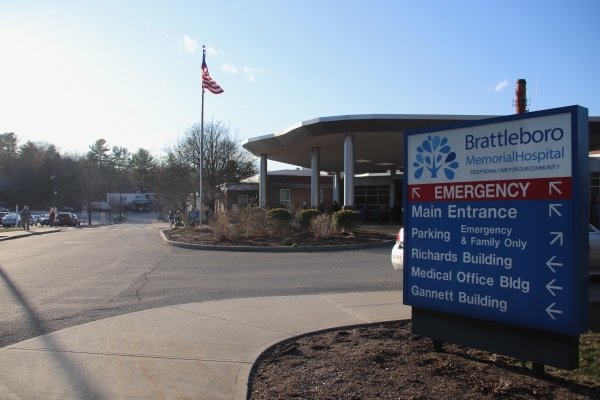Brattleboro Memorial Hospital (BMH) is one of four rural health care providers in Vermont that will share in $2.72 million in federal funding through the U.S. Department of Agriculture's Emergency Rural Health Care (ERHC) grant program.
The announcement was made on Sept. 15 at Springfield Hospital during a gathering of health care experts, funding recipients, and congressional representatives for a panel discussion on the state of health care in Vermont convened by USDA Rural Development's Vermont and New Hampshire office.
While those funds and a spirit of collaboration made panelists optimistic, all were in agreement: Rural health care is in a crisis.
“Our health care system is fragile, and it is under extreme stress,” said Sarah Waring, state director of USDA Rural Development in Vermont and New Hampshire. “We've moved from an urgent emergency during the pandemic, to a clear and enduring emergency, particularly when it comes to our workforce and our business model.”
The money comes from the USDA's Emergency Rural Health Care grant program. In total, the grants will supply up to $475 million nationwide through the federal American Rescue Plan Act, $74 million of which was announced in August.
Brattleboro Memorial Hospital says it will use the $637,600 grant to modernize equipment and make improvements at the 61-bed facility “that meet the increasing demands of telemedicine, including an upgraded phone system, smart beds, lifts, portable beds and stretchers, and cutting-edge diagnostic and treatment equipment,” according to a USDA news release.
Of the rest of the ERHC money headed to Vermont, $1 million will go to Springfield Hospital to ease pandemic losses and update infrastructure; $1 million will support an expansion of the Little Rivers Health Care clinic in Wells River; and $88,000 will help fund kitchen and food-storage improvements at the Upper Valley Haven's food shelf.
Hospitals still financially reeling
Vermont's hospitals relied on government aid to stay afloat during the pandemic but are still reeling financially from the crisis and the staffing shortages and cost inflation that followed.
The University of Vermont Medical Center and Rutland Regional Medical Center - the state's two biggest hospitals - both asked for significant annual budget increases, 10 percent and 16 percent, respectively, for the coming year.
They aren't alone. Springfield Hospital, which had financial troubles before the pandemic, has requested a 7.5 percent increase, citing, among other factors, increased costs associated with traveling staff.
In an August presentation to the Green Mountain Care Board, Springfield Hospital, which serves towns in northern Windham County, said it had spent more than twice as much on traveling staff in 2022 as it had the year before, totaling a projected $4 million this year.
As part of its increased budget request, the hospital proposed a 39 percent increase in recruiting and advertising expenses. At the Sept. 15 panel, Robert Adcock, Springfield Hospital's CEO, said the hospital had used marketing funds to hire a dedicated recruiter and create incentive programs to retain staff, both of which would decrease reliance on traveling workers.
Panelists outlined three recent phases of crisis experienced during the pandemic: COVID-19 itself, associated mental health issues, and later, economic hardship.
Christopher Dougherty, CEO of Brattleboro Memorial Hospital, highlighted the pandemic-related “absorbed costs” now added to hospital budgets. Things like at-the-door health screenings, increased personal protective equipment and COVID-19 testing are all new costs that have to be endured, he said.
Adcock told those present he anticipated a fourth, which will occur “when we see the long term effects of untreated health care issues” related to care put off or unavailable during the pandemic.
That fourth crisis, though, might be eased by this federal funding, according to Little Rivers Health Care's CEO Andrew Barter.
“It allows us to have the infrastructure to provide those services,” he said. “The first antiviral medications we provided were in a three-sided garage. This funding bills for isolation exam rooms.”
Covid response affects FY23 budgets
Most hospitals around Vermont have noted that little to no state or federal COVID-19 aid is coming their way in fiscal year 2023, as they still deal with shockwaves from previous surges continue to affect budgets.
According to data from the Vermont Agency of Human Services released earlier this year, Vermont hospitals received more than $301 million in state and federal aid between the coronavirus pandemic in 2020 and April 2022.
Brattleboro Memorial Hospital received $14,488,470 in funding during that period to deal with with losses from delaying surgeries and other non-urgent care, as well as to pay for testing, immunization, and other COVID-19 activities.
According to BMH spokesperson Gina Pattison, the hospital took a more precautionary approach and built COVID-19 response costs into its FY 2023 budget, which takes effect on Oct. 1.
Last week, the Green Mountain Care Board approved BMH's fiscal year 2023 budget of $108,480,389, which includes a 14.9 percent rate increase over the FY22 budget of $96,860,486. The hospital's actual expenditures for FY22 are projected to be $104,384,215.
Pattison told VTDigger in July that while the hospital budgeted for some Covid response, a surge that's large enough to “significantly impact staffing, force the cancellation of elective procedures and require closure of our operating rooms would adversely impact” hospital finances, requiring “relief funds of some kind.”
Executives at BMH built in expenses such as expanding the infection prevention program, continuing to fund screening personnel, and maintaining a seven-bed negative pressure unit for COVID-19 patients at the hospital.
BMH ended fiscal year 2021 with a $1.6 million deficit from operations. Even so, the hospital finished the year with a $4 million surplus overall, according to filings with the Green Mountain Care Board.
